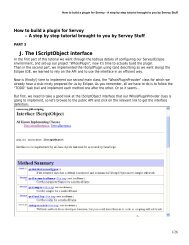Step by step tutorial: how to build a bean for Servoy - Servoy Stuff
Step by step tutorial: how to build a bean for Servoy - Servoy Stuff
Step by step tutorial: how to build a bean for Servoy - Servoy Stuff
You also want an ePaper? Increase the reach of your titles
YUMPU automatically turns print PDFs into web optimized ePapers that Google loves.
How <strong>to</strong> <strong>build</strong> a <strong>bean</strong> <strong>for</strong> <strong>Servoy</strong> - A <strong>step</strong> <strong>by</strong> <strong>step</strong> <strong>tu<strong>to</strong>rial</strong> brought <strong>to</strong> you <strong>by</strong> <strong>Servoy</strong> <strong>Stuff</strong><br />
Then we need <strong>to</strong> update it each time the record changes, in the setSelectedRecord() method, which<br />
will now be:<br />
public void setSelectedRecord(IRecord record) {<br />
this.currentRecord = record;<br />
if (<strong>Servoy</strong>Utils.isContainedInFoundset(record, getDataProviderID())) {<br />
Object o = currentRe cord.getValue(getDataProviderID());<br />
setText((o==null) null : o.<strong>to</strong>String());<br />
previousText = getText();<br />
}<br />
}<br />
And in our actionPer<strong>for</strong>med() method we will add a test be<strong>for</strong>e updating the current record:<br />
public void actionPer<strong>for</strong>med(ActionEvent e) {<br />
if (!Utils.stringSafeEquals(previousText, getText())) {<br />
if (<strong>Servoy</strong>Utils.isContainedInFoundset(currentRecord,<br />
getDataProviderID())) {<br />
if (currentRecord.startEditing()) {<br />
currentRecord.setValue(getDataProviderID(), getText());<br />
}<br />
}<br />
}<br />
}<br />
Note that I used a call <strong>to</strong> Utils.stringSafeEquals(), now why do I need a special method and where<br />
does that Utils class come from<br />
First as the name of the method implies, it is a safe test on equality.<br />
Why safe Because it tests if the String are null be<strong>for</strong>e calling equals on the objects.<br />
As you know calling myString.equals(anotherString) in Java will fire a NullPointerException (the<br />
dreaded NPE that is the plague of every Java programmer) if myString is null.<br />
And the first time we call this test, we know that our previousText will be null, and the text of the slider<br />
might be null as well. This is where the Utils.stringSafeEquals helps.<br />
The Utils class fully qualified name is actually com.servoy.j2db.util.Utils.<br />
That’s right it’s coming from the <strong>Servoy</strong> public API! – And yes, it is public.<br />
You can have a look at it in the public API and you will see that this class is full of convenience<br />
methods like this one that you can use freely inside your plugins and <strong>bean</strong>s and which are meant <strong>to</strong><br />
help you! All the methods in the Utils class are static so you can use them from anywhere in your code.<br />
So, you know that if Eclipse complains that it can’t find Utils, you can use ctrl+space (cmd+space on<br />
Mac) and choose com.servoy.j2db.util.Utils and it will happily add the import in the header of your<br />
class.<br />
Now each time our actionPer<strong>for</strong>med() method is called it will first test if the record really needs <strong>to</strong> be<br />
updated and will do so only if needed.<br />
That’s it <strong>for</strong> our SwingTestBean!<br />
8/37



